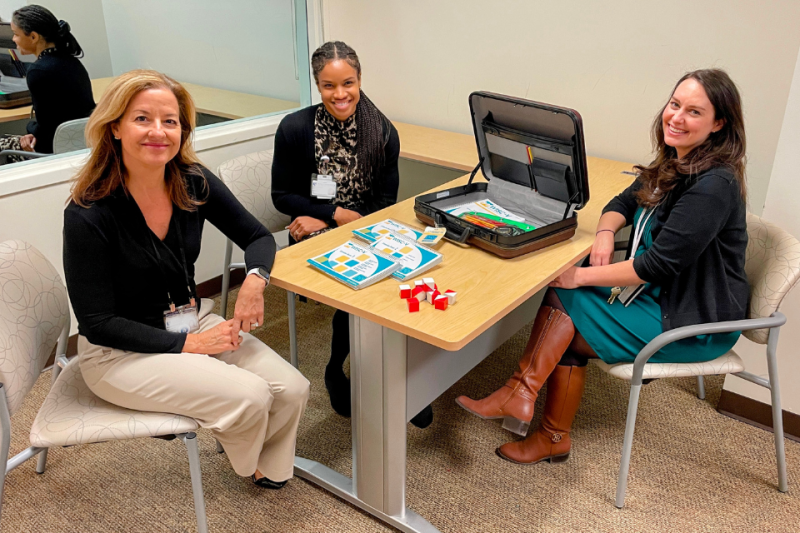
Brain tumors are rare in children, afflicting only about 5,000 children in the U.S. each year—but those who are diagnosed with brain tumors need highly specialized care from a multidisciplinary team of providers.
Duke University Health System is one of the few places in the area where children with brain tumors can receive a full range of clinical services, said Melanie Bonner, PhD, a professor in psychiatry and behavioral sciences who leads the Duke Pediatric Neuropsychology Clinic. Duke’s robust expertise across relevant domains—including pediatrics, neurooncology, surgery, and radiation—makes this specialized care possible.
“We see a lot of patients from out-of-town, particularly from rural areas, because providers in those areas may not have seen many children with brain tumors,” said Bonner. “Duke is one of only several institutions with the best and the latest clinical trials for treating these tumors.”
“Duke is one of only several institutions with the best and the latest clinical trials for treating these tumors.”
— Melanie Bonner, PhD
Assessing Brain Function
One facet of that care takes place in the neuropsychology clinic, where Bonner and other clinicians conduct comprehensive evaluations to test specific brain functions in children with a brain tumor, brain injury, chronic disease, or other factors that put them at risk for cognitive problems.
“Evaluations are pretty complex and last about four to five hours,” said Bonner. “There’s a lot of testing, interviewing, observation, and data collection from the medical chart, child, parent, school, and sometimes other sources.”
The goal of the evaluations is to gain an accurate assessment of the child’s current cognitive function, formulate an intervention plan, and refer families to the services they need. Of the more than 400 patients served in the Pediatric Neuropsychology Clinic each year, about 45 with brain tumors are seen on Fridays, where time and space are dedicated to their care.
Duke’s Pediatric Neuropsychology Clinic was expanded in 2017 with support from the Preston Robert Tisch Brain Tumor Center and Duke Children’s Hospital. The clinic aims to eliminate socioeconomic barriers by offering free neuropsychology evaluations regardless of a family’s insurance or financial means, and connecting families to appropriate treatment.
Creating a Neuropsychology Pipeline
The state-of-the-art care Duke provides to children with brain tumors—along with the focus on equitable access to that care—are two of the top reasons Tiffany Rowell, PhD, chose to remain at Duke after completing her clinical psychology doctoral internship.
Rowell, one of three postdoctoral fellows currently working in the clinic, has been broadly interested in working with traumatized youth and their families and has made it a career goal to research and advocate for equitable mental health care.
“Sometimes trying to provide equitable service when there’s not much equity within the mental health field can be quite challenging, but the work we’re doing is trying to alleviate that in some way.”
— Tiffany Rowell, PhD
Being a part of the clinic team aligns well with this aspiration, which can feel elusive at times. “Sometimes trying to provide equitable service when there’s not much equity within the mental health field can be quite challenging,” she reflected. “But the work we’re doing is trying to alleviate that in some way.”
In graduate school at Kent State University, Rowell hadn’t had much exposure to neuropsychology but was interested in learning more about conducting psychology assessments. After rotating in the neuropsychology clinic during her internship and seeing the program’s wide range of training opportunities and expertise, she couldn’t turn down a chance to join the team.
As a postdoc, Rowell conducts evaluations, makes recommendations based on the data, analyzes data, works with families, and supervises graduate students.
“I collect data, write it out in a story, and integrate it so a family can understand what it means for their child, then connect them with resources, whether that’s recommending academic interventions or coordinating them with a Duke provider to make sure they get they get referrals to other services,” Rowell said. “It feels great to be able to give back to these families after all they’ve been through.”
After her experience at the clinic, Rowell is considering pursuing a career in pediatric neuropsychology.
Building Capacity for Specialized Services
Bonner and her team are committed to training early-career clinical psychologists in this work—and in doing so, they’re expanding Duke’s capacity to offer neuropsychological evaluations to children who need them.
Erin Denio, PhD, an assistant professor of psychiatry and behavioral sciences who supervises postdocs in the clinic, expands on the clinic’s training model: “As the year progresses, my goal is for my postdocs to be independent and basically not need me. I’m just there to make sure everything’s running smoothly,” she said. “So far we’ve had a lot of success. My own experience as a postdoc in this clinic was really formative in terms of me developing the skills, and also confidence.”
Denio is driven by her desire to help children and families who need it most. “It’s always a challenge trying to find mental health resources for these kids. I’ll hear from families, ‘We tried to get on a therapy waitlist and we’ve been waiting for months, but providers don’t feel comfortable seeing my child because he’s so medically complex,’” Denio said. “Resources across the country are inadequate to meet children’s needs right now. And I think there are levels of that need that Duke is better able to address.”